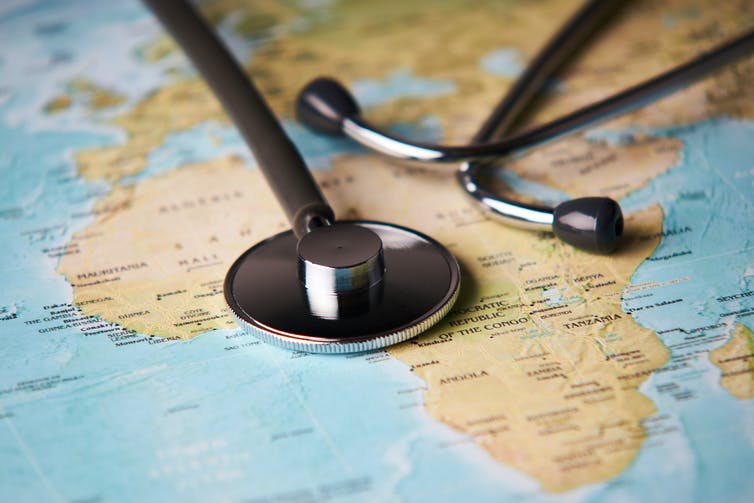On December 12, every year, discussions are focused on plans and strategies for Universal Health Coverage. A day set aside by the World Health Organization (WHO) for nations to do a retrospective evaluation and prospectively plan to achieve this global mandate.
This important health systems goal ensures that all residents, irrespective of their socioeconomic status, have access to needed quality health services without suffering financial hardship. This simply means that nobody or households should be made poorer for the singular fact that they are sick at any particular time.
As we all know, we do not know the day, time and where we will be sick. Health status uncertainty is complicated by the fact that the demand for health services is inelastic, thus the sick and vulnerable are left at the mercy of the healthcare providers. Regrettably, many who seek healthcare services usually end up with catastrophic and impoverishing expenditure made as user fees at point of care as they lack financial risk protection through a well-structured pre-payment mechanism.
Health is a fundamental right as enriched in many nations’ constitutions, including the WHO constitution of 1948. Ironically, this right to good health is denied many citizens whose health systems do not factor social protection and population-based health financial risk protection. Therefore, the easiest way to restore this citizen’s right and dignity in nationhood is for nations to work towards achieving Universal Health Coverage. The drive towards it is about equity, quality and financial risk protection. It is about social inclusiveness, citizen’s welfare and social security. It is also about achieving goal 3.8 of Sustainable Development Goals set by the United Nation in the 2015-2030 development agenda. Therefore, it is a clarion call to all stakeholders, states and non-state actors to act because a healthy population is pivotal to development and economic prosperity.
The global pandemic of COVID 19 exposed the non-resilience and non- responsiveness of many nations’ health systems, including developed economies.
This ugly situation was worst in nations with weak investment to the health sector, including Nigeria. The COVID 19 situation was a double shock with both the health sector and economy feeling the adverse effects. All efforts of the Presidential Task Force on COVID 19 were centered around a policy drive from this double shock to a double recovery. The COVID-19 experience confirmed the assertion that there is a strong positive correlation between investment in the heath sector and economic growth and development. This to us is a positive externality of COVID-19 to the health sector.
Nigeria’s Universal Health Coverage drive overtime has been bewildered with numerous challenges, ranging from poor population coverage, supply side inadequacies, weak fiscal space and legal bottlenecks to lack of needed ‘political will.’ This therefore resulted in many households financing their healthcare needs through the regressive out of pocket payment system. The 2019 National Health
Accounts in Nigeria which officially tracks health care expenditure pattern clearly showed that over 70.5 percent of healthcare expenditure is done through this catastrophic and inequitable means called the Out-Of-Pocket expenditure. This figure is far above the below 20-30 percent acceptable benchmark set by WHO. What this simply means is that households are shouldering the burden of healthcare cost in Nigeria as against the Universal Health Coverage guiding principle that lays emphasis on public spending. This public spending includes general tax revenue, earmarked tax, social health insurance, health tax and other innovative health financing sources.
Despite these daunting challenges, some improvements have been made on the supply side readiness, especially at the primary level of care, decentralization of social health insurance to the states, sustained advocacy for equity funds to finance the poor and vulnerable. Disbursement of the earmarked funds from consolidated revenue of the Federal Government called Basic Health Care Provision Fund to the implanting entities at the state level is another landmark achievement.
The gateways to the implementation of this catalytic and novel earmarked fund which are the National Health Insurance Scheme (NHIS), the National Primary Health Care Development Agency (NPHCDA), the Federal Ministry of Health and the Nigerian Centre for Diseases Control (NCDC) are encouraged to demonstrate more absorptive capacity, sustain efficiency and accountability in the utilization of this fund meant for the residents, especially the vulnerable.
COVID-19 has shown our inadequacies, therefore making investment case for health justified and imperative. Health system actors, policy makers and other stakeholders should also begin to work across state governments on other sustainable domestic resource mobilization strategies to finance health.
We should begin to advocate improved funding for the health sector at the state and local government levels with budget estimates truly released in every fiscal year to finance health. The political will to achieve Universal Health Coverage has always been the magic wand as seen in Thailand, South Korea, Mexico, Japan and now our African brother, Rwanda. Therefore, we must sincerely and urgently provide these at all levels in Nigeria.
Investing in the health sector for the improvement of economic growth and development should be pivotal to all political discussions, including the 2023 general elections in Nigeria.
Our health is our wealth. UHC is a journey but it is possible.
Uchenna Ewelike, MBBCh, PhD, Senior Health Economist & Imo State Coordinator of NHIS, writes from Owerri

 Join Daily Trust WhatsApp Community For Quick Access To News and Happenings Around You.
Join Daily Trust WhatsApp Community For Quick Access To News and Happenings Around You.


